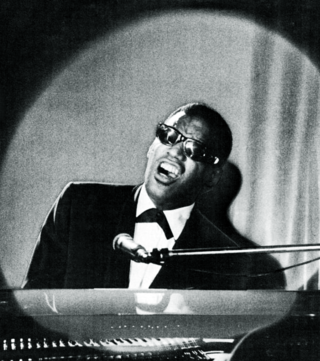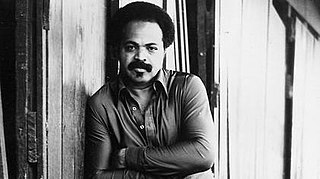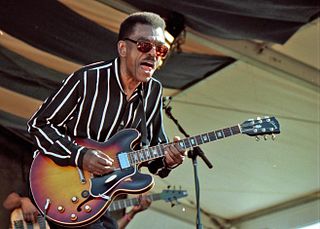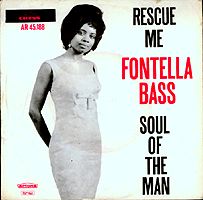
Rhythm and blues, frequently abbreviated as R&B or R'n'B, is a genre of popular music that originated within African-American communities in the 1940s. The term was originally used by record companies to describe recordings marketed predominantly to African Americans, at a time when "rocking, jazz based music ... [with a] heavy, insistent beat" was becoming more popular. In the commercial rhythm and blues music typical of the 1950s through the 1970s, the bands usually consisted of a piano, one or two guitars, bass, drums, one or more saxophones, and sometimes background vocalists. R&B lyrical themes often encapsulate the African-American history and experience of pain and the quest for freedom and joy, as well as triumphs and failures in terms of societal racism, oppression, relationships, economics, and aspirations.

Soul music is a popular music genre that originated in the African American community throughout the United States in the late 1950s and early 1960s. It has its roots in African-American gospel music and rhythm and blues. Soul music became popular for dancing and listening, where U.S. record labels such as Motown, Atlantic and Stax were influential during the Civil Rights Movement. Soul also became popular around the world, directly influencing rock music and the music of Africa. It also had a resurgence in the mid-to late 1990s with the subgenre neo-soul, which added modern production elements and influence from hip-hop.

The Delfonics were an American R&B/soul vocal group from Philadelphia. The Delfonics were most popular in the late 1960s and early 1970s. Their most notable hits include "La-La ", "Didn't I ", "Break Your Promise", "I'm Sorry", and "Ready or Not Here I Come ". Their hit songs were primarily written by lead vocalist and founding member William "Poogie" Hart, and arranger and producer Thom Bell. Wilbert Hart is the last surviving founding member.

Jerry Butler Jr. is an American soul singer-songwriter, producer, musician, and retired politician. He was the original lead singer of the R&B vocal group the Impressions, inducted into the Rock and Roll Hall of Fame in 1991. After leaving the group in 1960, Butler achieved over 55 Billboard Pop and R&B Chart hits as a solo artist including "He Will Break Your Heart", "Let It Be Me" and "Only the Strong Survive". He was inducted into the National Rhythm & Blues Hall of Fame in 2015.

Arzell J. "Z. Z." Hill was an American blues singer best known for his recordings in the 1970s and early 1980s, including his 1982 album for Malaco Records, Down Home, which stayed on the Billboard soul album chart for nearly two years. The track "Down Home Blues" has been called the best-known blues song of the 1980s. According to the Texas State Historical Association, Hill "devised a combination of blues and contemporary soul styling and helped to restore the blues to modern black consciousness."
Memphis soul, also known as the Memphis sound, is the most prominent strain of Southern soul. It is a shimmering, sultry style produced in the 1960s and 1970s at Stax Records and Hi Records in Memphis, Tennessee, featuring melodic unison horn lines, organ, guitar, bass, and a driving beat on the drums.
Donald James Randolph, better known by the stage name Don Covay, was an American R&B, rock and roll, and soul singer-songwriter most active from the 1950s to the 1970s.

Sylvester Johnson was an American blues and soul singer, musician, songwriter and record producer. His most successful records included "Different Strokes" (1967), "Is It Because I'm Black" (1969) and "Take Me to the River" (1975).

"Don't Let Them" is a song by American singer Ashanti. It was written by Ashanti along with its producers Irv Gotti and Demetrius "Demi-Doc" McGhee for her third studio album, Concrete Rose (2004). The song contains interpolations from "Could I Be Falling in Love" (1974) by American blues and soul singer Syl Johnson. Due to the inclusion of the sample, Willie Mitchell, Yvonne Mitchell, Earl Randle, and Lawrence Seymour are also credited as songwriters.

"Rescue Me" is a rhythm and blues song first recorded and released as a single by American soul singer-songwriter Fontella Bass in 1965. The original versions of the record, and BMI, give the songwriting credit to Raynard Miner and Carl William Smith, although many other sources also credit Bass herself as a co-writer. It would prove the biggest hit of Bass's career, reaching #1 on the R&B charts for four weeks and placing at #4 on the Billboard Hot 100. "Rescue Me" also peaked at #11 on the UK Singles Chart.

Twinight Records was a minor American recording label, founded in Chicago 1967 by Howard Bedno and Peter Wright, who later added E. Rodney Jones as a partner. Specializing in R&B and soul music, for a few months the label was called Twilight Records until it was discovered that another company already owned the Twilight name. Over five years, the label released 55 singles and charted seven times. The label’s star was Syl Johnson, an established R&B performer who had had a number of hits for King Records and who would have his biggest hits for Hi Records in the 1970s.

Chapter 4: Labor Pains is the fifth studio album by American singer Syleena Johnson. It was released digitally on December 23, 2008, and physically on January 13, 2009, on Johnson's own label, Aneelys Entertainment, after her departure from longtime record company Jive Records. Distribution was handled by Universal Music Group and Federal Distribution. Upon its release, Chapter 4 entered the US Billboard Top R&B/Hip-Hop Albums chart at number forty-two. Chapter 4's lead single was "It Is True", which was made available on iTunes on June 24, 2008, and impacted radio on July 1.
"Tramp" is a soul blues song with funk elements, written by West Coast blues artists Lowell Fulson and Jimmy McCracklin. First recorded by Fulson in 1967, it was his highest-charting single since "Reconsider Baby" in 1954. It reached #56 in Canada. The song was covered by Otis Redding in a duet with Carla Thomas, and this version reached No. 2 on Billboard R&B chart.
James Earl Thompson, known professionally as Jimmy Johnson, was an American blues guitarist and singer.
The Notations are an American soul group formed at high school in Chicago, Illinois in the late 1960s.

Cash McCall was an American electric blues guitarist, singer and songwriter. He was best known for his 1966 R&B hit "When You Wake Up". Over his long career, his musical style evolved from gospel music to soul music to the blues.

Josephine Armstead, also known as "Joshie" Jo Armstead, is an American soul singer and songwriter. Armstead began her career singing backing vocals for blues musician Bobby "Blue" Bland before becoming an Ikette in the Ike & Tina Turner Revue in the early 1960s. She also had some success as a solo singer, her biggest hit being "A Stone Good Lover" in 1968. As a songwriter, Armstead teamed up with Ashford & Simpson. The trio wrote hits for various artists, including Ray Charles, Aretha Franklin, Tina Britt, Ronnie Milsap, and Syl Johnson. In the 1970s, Armstead appeared in the Broadway musicals Don't Play Us Cheap and Seesaw.
"That's Why (I Love You So)" is a song written by Berry Gordy Jr. and Tyran Carlo and performed by Jackie Wilson. It reached #2 on the U.S. R&B chart and #13 on the U.S. pop chart in 1959. It was featured on his 1959 album Lonely Teardrops.

Back in the Game is an album by the American musician Syl Johnson. It was released in 1994. Johnson had not recorded an album since the 1980s, but had witnessed a revival of his music due its use as samples in hip hop production. Back in the Game was named the best blues album of 1994 by Living Blues.
The discography of Syl Johnson (1936–2022), an American blues and soul singer and record producer, consists of at least 19 studio albums, 18 compilation albums and a large number of singles and EPs.












